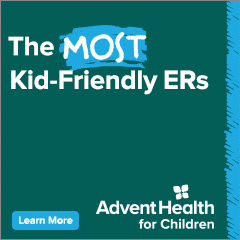Varying Vaccine Viewpoints
According to data from the American Academy of Pediatrics, more than six million children have tested positive for COVID-19 since the pandemic began. Over one million of those cases occurred this past September, as many schools reopened with in-person classes. While the likelihood of COVID causing severe illness or death is a much lower risk for children than adults, over 500 children have died from the coronavirus.
While some parents are eager to vaccinate their children against COVID as soon it becomes available, others are undecided or completely opposed to the idea. “I’m pro-vaccination, but hesitant to vaccinate my children at this particular point in time,” says a Winter Garden mother of three young children. “The adults in my family received their COVID vaccinations, and despite this, we recently experienced a breakthrough infection. Though my children tested positive, their symptoms were mild to non-existent. My hesitancy comes from not wanting to vaccinate them against something that they have already been exposed to without any effects.”
That viewpoint is shared by many, notes Dr. Lisa Gwynn, president of the Florida chapter of the American Academy of Pediatrics (FCAAP). “Parents have a lot of questions and rightfully so. The fact that children are not affected as severely as adults is deterring some parents from wanting to have their kids vaccinated. When the vaccines for polio and measles came out, parents rushed to get their kids vaccinated because if children were to get infected with those diseases, it could lead to very serious consequences and even death. With COVID, it’s not as common, although it does happen.”
When vaccines for children aged 12 to 17 became available earlier this year, many parents rushed to have their children vaccinated. However, notes Dr. Gwynn, “The downside is, now the vaccine rates for that age group are going down sharply. We are currently at about 46% of all kids ages 12-17 being completely vaccinated across the country. So, it took about five months to get about half of that age group completely vaccinated, which is great, but now we’ve hit a wall.” She adds, “We don’t know exactly what the vaccination rate will be for kids ages 5-11 but we have seen initial data of surveys from parents that have indicated that only about 35% of parents of that age group are planning to get their kids vaccinated immediately, which means 65% of parents are hesitant.” For those parents, Dr. Gwynn says, “We always encourage parents to speak with their pediatrician regarding their concerns and to seek information from a reliable source and not their neighbor or Facebook group.”
Dr. Gwynn notes that the COVID vaccine is more than just protection for the person receiving it.
“It’s not just about your individual child, it’s about this pandemic at large. The longer this virus lives in humans, the more chances it has to mutate.” She adds, “Oftentimes, kids carry it and we don’t even know they have it so they are still spreading it to others. We have to kill the virus in the host and the only way to do that is to vaccinate.”
A Windermere mother of a 9-year-old daughter, who recently tested positive for COVID, expressed concerns about her child receiving the vaccine. “I initially wanted to vaccinate my child, but after she was recently infected with COVID-19, I am now unsure,” she says. “I’d like to have more data on vaccinating children after infection. I think my concern stems from a fear of overwhelming her body too soon, especially since full recovery from COVID-19 is truly an individual experience.”
Dr. Gwynn says she has heard similar concerns. “A lot of people feel that way. We don’t have the data on kids regarding how long their immunity lasts. We do know in adults, many that had COVID no longer have antibodies after so many months and so the recommendation for adults is, even if you have had COVID, you still need to get the vaccine. We anticipate the same thing happening for kids but we don’t yet know for sure.”
While some parents are on the fence regarding the vaccine, others are eagerly awaiting the opportunity to have their children vaccinated. Orlando father Andrew Roy and his wife Jamie have already taken steps to vaccinate their two young sons from the coronavirus. Camden, 7, and Brooks, 5, recently participated in a clinical trial of the COVID vaccine for children in Orlando. Roy explains, “Since about this time last year, when some of the trials were announced, my wife and I continually applied through the Pfizer program to try and have the boys participate in a clinical trial. For the longest time, there was nothing in our area. We tried for a Moderna trial as well. We finally heard back from Pfizer via CNS Healthcare and signed up for a trial that was happening near downtown Orlando.”
Roy explains his family’s desire to have their sons vaccinated as soon as possible is mainly due to the fact that “Brooks is medically vulnerable and we think has a higher chance of having an adverse outcome if he were to be infected with COVID. He has a rare genetic condition and so from our perspective, the potential impact that COVID could have on Brooks is much more significant than what we perceive as any risk associated with the vaccine.”
Prior to the clinical trial, Roy says, “There was a small part of me that was nervous but at the same time, the Pfizer vaccine for adults has been out for nearly a year and many studies have already been done. Frankly, this vaccine was already in the process of development and so it’s not like we were starting from scratch. I did feel confident in the science behind it and the safety protocols for the kids.” Of his sons’ participation in the clinical trial, the proud father says, “My wife and I did explain to the boys that their participation would benefit our community, our state and our country at large; I think that they understand that on some level and appreciated that they partook in something bigger than themselves that contributed back to the greater good.”
While Roy’s sons have now received two shots through the clinical trial, they do not yet know if either boy has received the actual vaccine or a placebo. “The study is such that there is a 2:1 ratio of vaccine to placebo. As of right now this is a blind study so we don’t know if in fact the boys received the vaccine or a placebo. Our understanding is that if they did not receive the vaccine, which we are hopeful to learn of soon, then the boys will get the vaccine shortly after it becomes available.” In the meantime, out of caution, the Roy family continues to move forward as though the boys have not been vaccinated which includes wearing masks and social distancing when possible.
If and when households become fully vaccinated, Dr. Gwynn urges everyone to continue to wear masks. “Unfortunately, we are not in a position to say things are like they were pre-pandemic. However, you should be able to start going back out and living your life—just wear a mask. The CDC recommends that you should wear a mask if you are at an indoor public establishment, especially if it is crowded. Outdoors, you can take off your mask, although in crowded conditions they recommend that you wear a mask. Masks help keep everyone protected.”
According to Dr. Gwynn, parents shouldn’t hesitate to get their child vaccinated. She states, “At this point, the data on vaccines for children has been very favorable. We in the medical community rely on the mechanisms that are in place for close analysis and this data goes to all of the respected agencies just like any other vaccine does. We are putting our faith in the scientific community and that’s all we can do at this point.” However, for those parents who have questions or concerns, Dr. Gwynn reiterates, “Talk to your child’s pediatrician.”
Though a smaller dosage, the Pfizer vaccine regimen for children will be the same as adults, consisting of two shots. The CDC has reported that post-vaccine side effects in children who participated in clinical trials are similar to those experienced by adults. Dr. Gwynn is optimistic that vaccinating this new age group could make a huge difference in the fight against COVID-19. “Things are definitely looking much more promising,” she notes. “There are currently clinical trials underway for children and babies all the way down to six months of age. We think that vaccine is going to come out around late next spring.”
She adds that a COVID-19 shot is “probably going to be part of our annual vaccine that we give each year, much like the flu shot.” Until the pandemic has truly passed, Dr. Gwynn advises everyone to “use caution and continue to wear masks.”








